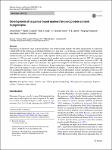| dc.contributor.author | Obala, Jimmy | |
| dc.contributor.author | Saxena, Rachit K. | |
| dc.contributor.author | Singh, Vikas K. | |
| dc.contributor.author | Kumar, C. V. Sameer | |
| dc.contributor.author | Saxena, K. B. | |
| dc.contributor.author | Tongoona, Pangirayi | |
| dc.contributor.author | Sibiya, Julia | |
| dc.contributor.author | Varshney, Rajeev K. | |
| dc.date.accessioned | 2023-02-09T08:16:36Z | |
| dc.date.available | 2023-02-09T08:16:36Z | |
| dc.date.issued | 2019 | |
| dc.identifier.citation | Obala, J., Saxena, R. K., Singh, V. K., Kumar, C. S., Saxena, K. B., Tongoona, P., ... & Varshney, R. K. (2019). Development of sequence-based markers for seed protein content in pigeonpea. Molecular Genetics and Genomics, 294, 57-68. | en_US |
| dc.identifier.uri | https://doi.org/10.1007/s00438-018-1484-8 | |
| dc.identifier.uri | http://ir.lirauni.ac.ug/xmlui/handle/123456789/498 | |
| dc.description.abstract | Pigeonpea is an important source of dietary protein to over a billion people globally, but genetic enhancement of seed protein
content (SPC) in the crop has received limited attention for a long time. Use of genomics-assisted breeding would facilitate
accelerating genetic gain for SPC. However, neither genetic markers nor genes associated with this important trait have been
identified in this crop. Therefore, the present study exploited whole genome re-sequencing (WGRS) data of four pigeonpea
genotypes (~ 12X coverage) to identify sequence-based markers and associated candidate genes for SPC. By combining
a common variant filtering strategy on available WGRS data with knowledge of gene functions in relation to SPC, 108
sequence variants from 57 genes were identified. These genes were assigned to 19 GO molecular function categories with
56% belonging to only two categories. Furthermore, Sanger sequencing confirmed presence of 75.4% of the variants in 37
genes. Out of 30 sequence variants converted into CAPS/dCAPS markers, 17 showed high level of polymorphism between
low and high SPC genotypes. Assay of 16 of the polymorphic CAPS/dCAPS markers on an F2 population of the cross ICP
5529 (high SPC)×ICP 11605 (low SPC), resulted in four of the CAPS/dCAPS markers significantly (P<0.05) co-segregated
with SPC. In summary, four markers derived from mutations in four genes will be useful for enhancing/regulating SPC in
pigeonpea crop improvement programs | en_US |
| dc.language.iso | en | en_US |
| dc.publisher | Molecular Genetics and Genomics | en_US |
| dc.subject | Seed protein content | en_US |
| dc.subject | Cajanus cajan | en_US |
| dc.subject | Whole-genome resequencing | en_US |
| dc.subject | Next generation sequencing | en_US |
| dc.subject | Sequence variants | en_US |
| dc.subject | Common variant analysis | en_US |
| dc.title | Development of sequence-based markers for seed protein content in pigeonpea | en_US |
| dc.type | Article | en_US |

